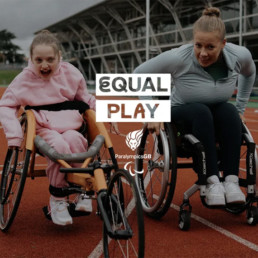
Written by ParalympicsGB
ParalympicsGB is the UK’s largest disability sports charity and relies on the support of its commercial partners to deliver a world class environment where athletes can achieve their personal best performances and break down barriers for all disabled people. Further details are available at https://paralympics.org.uk/
Physical education (PE) has always offered young people the chance to develop confidence, teamwork, and physical literacy. However, for millions of disabled children across the UK, inclusive and meaningful PE is still largely inaccessible. In response, ParalympicsGB has launched their Equal Play Campaign, a transformative initiative to ensure every child, regardless of ability, has equal opportunities in school sports. This movement comes at a crucial time, aligning with the Government’s review of the national curriculum. With so much at stake, the campaign’s message is clear: action is needed now.
A curriculum review with high stakes for disabled pupils
The ongoing curriculum review holds immense potential to address systemic issues that have long affected disabled pupils and those with Special Educational Needs and Disabilities (SEND). Currently, PE is not considered a core subject, which means it often takes a back seat to academic priorities. Even when PE is available, it frequently focuses on traditional sports, leaving out disabled pupils who require adaptive and inclusive activities.
ParalympicsGB has raised serious concerns that disabled young people are being overlooked in the review. In a society where 1.5 million disabled children are missing out on essential physical activities, this is unacceptable. Alarmingly, only one in four disabled children regularly participate in school sports, denying them the chance to boost their development, social skills, and mental well-being. This is a disparity we can no longer ignore.
The importance of breaking barriers
Disabled pupils face a complex array of barriers that differ significantly between mainstream and special schools. Addressing these challenges requires a comprehensive and inclusive approach. Crucially, we must understand that disabled pupils are not a monolithic group; their needs vary widely. From a lack of specialised equipment to insufficient teacher training, the obstacles are varied but solvable with the right strategies.
ParalympicsGB advocates for a more holistic understanding of physical literacy, one that celebrates diverse ways of being active. This vision moves beyond traditional sports to include adaptive and non-competitive activities, turning PE into a positive and empowering experience. The impact of inclusive PE is profound: it not only improves physical health but also fosters social inclusion, boosts self-confidence, and establishes lifelong habits of well-being.
Transforming the culture of PE
Creating inclusive PE requires a cultural shift in how physical education is perceived and delivered. Currently, the existing model often leaves disabled children feeling excluded or unable to participate meaningfully. ParalympicsGB emphasises the need to reimagine PE, prioritising equity and inclusivity to ensure every student can engage and benefit.
A key factor in this transformation is empowering teachers. Teachers are crucial to implementing change but often lack the resources or training to adapt lessons for disabled pupils. ParalympicsGB stresses the importance of revising teacher training programs to include robust, practical modules on inclusive physical education. By equipping teachers with the right skills—such as modifying activities to accommodate diverse needs—we can ensure that all pupils have equal opportunities.
Representation also plays a critical role. Increasing the number of disabled people in teaching positions can make PE more relatable and inspiring for disabled pupils. Teachers with lived experiences of disability offer unique insights and can act as powerful role models. Seeing someone who shares their experiences and challenges can fundamentally change how disabled children view their own potential.
Practical solutions from the Equal Play Campaign
The Equal Play Campaign puts forward targeted, achievable solutions aimed at building a more inclusive PE landscape:
- Empowering teachers: Providing continuous professional development and resources, such as workshops, guides, and access to best practices, to help teachers deliver inclusive lessons confidently.
- Adapting teacher training: Reforming initial teacher education to include strategies for inclusive PE, ensuring teachers are well-prepared to support all pupils effectively.
- Redefining PE’s role: Shifting the emphasis from competition to physical literacy. This approach makes PE about personal growth, joy, and inclusivity, rather than just winning or losing.
- Boosting representation: Encouraging disabled individuals to become teachers, thus bringing valuable perspectives to schools and inspiring pupils.
These changes are not just aspirational but necessary. By implementing these measures, the Government can take significant steps toward educational equity, ensuring no child is left out.
The time for change is bow
The curriculum review presents a rare chance to set new standards for inclusivity in schools. ParalympicsGB’s Equal Play Campaign underscores that PE should be a welcoming space for all children to experience the joy of movement. This effort is about more than just sport; it represents a commitment to a society that values every member equally.
For those wanting to learn more, visit ParalympicsGB’s website. Teachers, parents, policymakers, and community members all have a role to play in creating an education system that genuinely leaves no child behind.
By advocating for inclusive PE, we are laying the groundwork for a future where diversity, equity, and inclusion are not merely aspirational values but everyday realities. Let’s ensure every child, regardless of ability, gets the chance to play, grow, and thrive.

